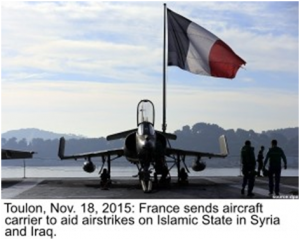23.11.15
Prince Michael of Liechtenstein
On November 20, the United Nations Security Council passed a resolution submitted by France on fighting Islamic State. It idealistically calls on UN member states to take ‘all necessary measures’ to fight the terror group and ‘eradicate the safe haven’ it has established in Iraq and Syria. The Russians had submitted a more realpolitik-based and inclusive resolution that would have sought the cooperation of the Assad government, but this was rejected by the United States, the United Kingdom and France, writes Prince Michael of Liechtenstein.The French resolution does not cite Chapter 7 of the UN charter, which allows for the use of military force. And while it does little to change the situation on the ground, the measure does represent movement in the perception of the international community.Islamic State, originally based in Iraq, spun off from al-Qaeda in 2013 and consolidated its presence in Syria as that country spiralled into chaos. The threat it posed was really only recognised in 2014, when it overran the Sunni Arab parts of Iraq, occupied Mosul and committed numerous atrocities, including genocide against the Christians and Yazidis.GIS has repeatedly explained why the US and Iraqi military responses to Islamic State were bound to fail: the US refused to send in boots on the ground and the Iraqi army was not motivated to fight for a failed state represented by the Baghdad government.The real underlying problems in the Middle East have so far been ignored. Nearly all US or European political and military operations in the region have only made the situation worse.These have mostly served as attempts to either enforce structures and principles on Middle Eastern countries that were not tailored to the specific local realities. Examples include attempts to institute ‘Shia democracy’ in Iraq or to bring about regime change in Syria, with disastrous results, or in Egypt, where disaster was only avoided by a military takeover.In the case of Syria, President Bashar al-Assad was identified as the enemy. Under the misguided principle of ‘the enemy of my enemy is my friend,’ the US and Europe supported opposition groups, some of them extremist. This created the ideal environment for the al-Nusra Front, Islamic State and other detestable movements.Circumstances changed with Russia’s military involvement in Syria. There was movement on the diplomatic front and efforts to resume negotiations on Syria re-materialised. The US began to talk about sending in ground troops.The Europeans, especially France, have decided to become more active. It may be we have reached a tipping point. Russia, Europe, the United States – and also Turkey, an essential regional player – have all now become involved.These and other important players in the region, including Iran and Saudi Arabia, joined in the Vienna summit on Syria in mid-November.Finally, they seem to have agreed (mainly based on insistence from Russia and Iran) to include the Assad government in the continuing negotiations. The countries also resolved that national elections should be held under UN supervision once the negotiations have concluded.But democratisation in Syria will only be sustainable in a federal system which ensures that the Sunni majority cannot subjugate the Christian, Alawite and Kurdish minorities. A powerful central government would only risk a repeat of the disaster in Iraq.Russia’s actions have given it significant influence in how events in the Middle East will play out. That may or may not be a positive development, depending on one’s point of view. But the good news is that for the first time since its civil war began, a ray of hope for peace in Syria has broken through.

